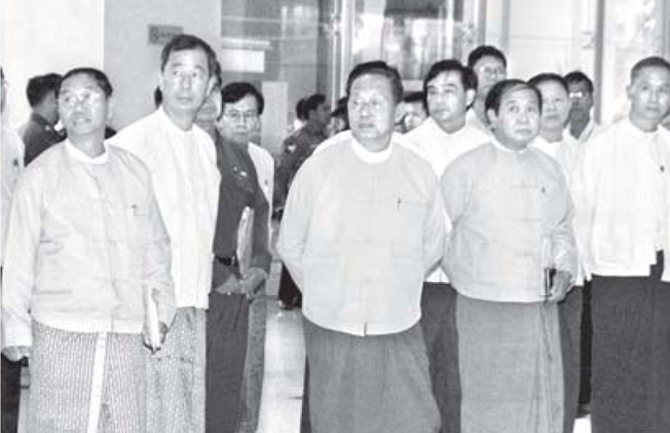Chinese businessmen are currently the richest in Burma—a fact that obviously doesn't sit well with the Burmese business community.
In a recent interview with an Italian journalist, Tay Za, one of Burma’s US-sanctioned tycoons, complained that “Too many Chinese have taken our citizenship and are now boasting they are the richest. But they’re not pure Burmese.”
One of Tay Za’s leading rivals is Tun Myint Naing, also known as Steven Law, 53, who has also been a target of US sanctions since early 2008.
Rangoon businessmen say that Law, a Kokang Chinese, has even surpassed Tay Za as Burma's wealthiest man thanks to his involvement in a number of mega projects run by the Chinese state-owned corporations, including a Sino-Burmese oil and gas pipeline project, a deep-sea port in Kyaukpyu, and the Myitsone and Tasang hydro-power dams.
Most notably, Law’s Asia World Company has been working closely with Chinese companies that own an 80 percent share of of Burma’s hydro-power projects. The Myitsone project alone is estimated to be worth US $3.6 billion. Total Chinese total investment in Burma since March 2010 is $8.17 billion, much of it connected in some way to Asia World.
Law did especially well when Vice President Tin Aung Myint Oo was the chairman of Burma’s Trade Policy Council, a body that has been disbanded since a new government was formed in March. The two men have been close since the mid-1990s, when then Brig-Gen Tin Aung Myint Oo was commander of the Military Operations Command 1 in Kyaukme, Shan State.
According to intelligence officials, the relationship between the two men began during the construction of the Mandalay-Kyaukme-Lashio-Muse road. At the time, military officials described Law’s family as “good givers”.
Law's father, drug kingpin and militia leader Lo Hsing Han,76, played a key role in cementing ties between Law and the Burmese generals.
“Among his children, Lo Hsing Han said that Steven Law was the best at doing business. That's why he chose him to deal with the ruling generals and to run the family's business interests in the cities. However, the other sons are also involved in secret businesses,” said a former Burmese intelligence officer who knows about the family's files, speaking on condition of anonymity.
“Lo Hsing Han is still well respected in the Kokang-Chinese business community. His other sons are reportedly based in Thailand, Singapore and Taiwan doing business. In accordance with Chinese tradition, Lo Hsing Han is seen as the godfather of the family business,” he added.
Law's involvement with the Burmese generals has not been limited to doing business, however. He also acted as a broker during ceasefire talks between the Burmese junta and Chinese-backed Kokang commanders of the Communist Party of Burma in 1989, when ethnic commanders revolted against the party.
Two decades later, Law continues to act as an important intermediary for Burma's generals. Because of his close ties to Chinese officials in Beijing, he accompanied President Thein Sein and his delegation to China in late May.
A Burmese official on the trip said that during the China visit, Law was often beside Thein Sein, chatting with the Burmese president. He added that Law sometimes acted as an interpreter between Thein Sein and Chinese officials, even when there were official interpreters present.
According to the Kachin Independence Army (KIA), a former ceasefire group that resumed fighting with the Burmese army in June, Law has paid a handsome price to earn the generals' trust.
“Based on our information from businessmen, Snr-Gen Than Shwe and Tin Aung Myint Oo receive 25 and 20 percent, respectively, of Asia World’s broker fees from Chinese companies in the hydro-power project deals in Kachin State,” said La Nan, joint-secretary of the KIA's political wing, the Kachin Independence Organization .
Law also enjoys other privileges, including occasional appearances in Burma's state-run media, often in the presence of Tin Aung Myint Oo.
Most recently, he was seen in a photo that ran alongside a report on the visit of Laotian Prime Minister Thongsing Thammavong to Rangoon's Ahlone Port on July 13. The port, built by Asia World, was showcased during the visit, giving Law a chance to build commercial ties not only with Naypyidaw and Beijing, but also with Vientiane.

